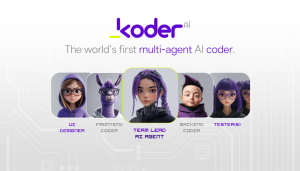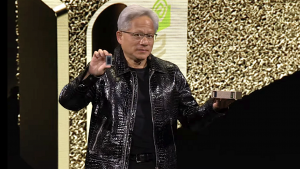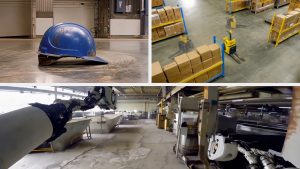Conversations With Consoles+ Spinning Webs With Spiber – SiliconANGLE News Roundup
![]() In today’s NewsDesk news roundup: Future Kinects will feature two-way conversation; Lenovo to push smartphone business in the US; Liberty Reserve founder arrested; Lambda Labs creating facial recognition app for Google Glass; Yahoo! exec to depart company; Samsung to use Atom chips in next-gen tablet; Raspberry Pis can be used to build supercomputers; Japan creates synthetic spider silk for use in auto parts;
In today’s NewsDesk news roundup: Future Kinects will feature two-way conversation; Lenovo to push smartphone business in the US; Liberty Reserve founder arrested; Lambda Labs creating facial recognition app for Google Glass; Yahoo! exec to depart company; Samsung to use Atom chips in next-gen tablet; Raspberry Pis can be used to build supercomputers; Japan creates synthetic spider silk for use in auto parts;
Future Kinect will feature two-way conversation
The Kinect controller will eventually be able to hold two-way conversations. At first, Kinect will use its facial recognition to scan the room for people it doesn’t recognize and ask them to identify themselves. Once the person replies, Kinect will welcome the new guest and remember their identity. Officials from Microsoft likened the function to iPhone’s Siri, which will eventually eliminate the need for a remote control.
Lenovo to push smartphone business in the US
Lenovo, the company best known for building computers, is looking to get into the American smartphone market, and their CEO says their push is going to be an aggressive one. Despite their strengths, Lenovo executives understand the challenge they face with the American smartphone market. The Chief Executive compared it to the fashion industry, adding that he understands the importance of marketing in America, and they plan on increasing their public presence very soon.
Liberty Reserve founder arrested
The founder of the payment service site Liberty Reserve, Arthur Belanchuk, was arrested in Spain this week for his alleged connection to a money laundering scheme. Though the investigation and arrest are intended to shut down Liberty Reserve’s alleged illegal activities, many social libertarians and legitimate users who use the site for its lack of regulation and relative privacy were hurt by the actions of law enforcement.
Lambda Labs creating facial recognition app for Google Glass
Lambda Labs is launching a facial recognition API for Google Glass. The new Google Gass specific technology will enable Glass apps to remember faces, find friends in a crowd, match interests with strangers, and create intelligent contact lists. Google’s Terms of Service for Glass don’t prohibit facial recognition technology at this time. For now, it appears Google won’t close the door on Lambda Labs, meaning lucky early-users could see this feature coming to Glass very soon.
Yahoo! exec to depart company
Tim Parsey, Senior VP of User Experience Design for Yahoo recently announced that he will be leaving the company. The overhaul in design at Yahoo originates from the appointment of Marissa Mayer as CEO last year. Mayer was involved in many of Google’s brightly colored design and branding choices. Since her departure, Google has opted to redesign its sites, choosing the cleaner, flat style seen today.
Samsung to use Atom chips in next-gen tablet
It looks like Samsung has elected to use Atom chips over their own mobile processors for their next tablet, the Galaxy Tab 3. It is likely that Samsung decided to use Intel chips because of their upcoming Haswell chips. The new microarchitecture is said to improve power and graphics performance dramatically, making them twice as powerful as previous atom chips, while also reducing power consumption by half.
Raspberry Pis can be used to build supercomputers
Supercomputers can be built with Raspberries, at least if you’re Simon Cox, and work at the University of Southampton. The Professor of Computational Methods coupled 64 of the now famous Raspberry Pi systems together and assembled his very own low-budget mini-supercomputer. Other academics, including Boise State’s PhD candidate Joshua Kiepert, also built supercomputers using the credit-card sized computers,which only contained thirty-two nodes, costing him just under Two Thousand dollars.
Japan creates synthetic spider silk for use in auto parts
A startup in Japan named Spiber has created a synthetic spider silk that could make advancements in multiple industries. Spiber developed a technology that uses synthesized genes and coaxes bacteria to produce fibroin, the structural protein in spider silk. Spiber is teaming up with an auto parts maker to build a plant that can turn out about 220 lbs of the synthetic silk a month.
Contributors: Mellisa Tolentino
A message from John Furrier, co-founder of SiliconANGLE:
Your vote of support is important to us and it helps us keep the content FREE.
One click below supports our mission to provide free, deep, and relevant content.
Join our community on YouTube
Join the community that includes more than 15,000 #CubeAlumni experts, including Amazon.com CEO Andy Jassy, Dell Technologies founder and CEO Michael Dell, Intel CEO Pat Gelsinger, and many more luminaries and experts.
THANK YOU













